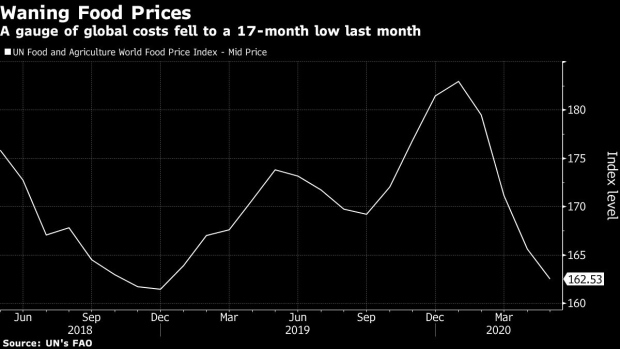Jun 11, 2020
Milk and Seafood Pile Up as Coronavirus Upends Sales, FAO Says
, Bloomberg News

(Bloomberg) -- Global meat and seafood markets have been upended by the coronavirus pandemic as stockpiles surge and sales slump.
This year’s dairy exports may post the steepest decline in three decades, and fish demand has been “severely” dampened by the pandemic, the United Nations’ Food & Agriculture Organization said Thursday in a 2020 outlook report. Growth in global meat trade will also slow as shuttered restaurants and weakening economies spur consumer cutbacks.
The products are among those facing swift impacts from the coronavirus, and food markets are likely to see “many more months” of uncertainty ahead, the FAO said. Salmon demand will shrink 15% or more this year, and milk sales are likely to stay subdued.
“Plummeting food service sales have resulted in meat stock accumulation, especially premium categories,” the report said. “Entire fishing fleets are laying idle due to a combination of poor demand and restrictions on crews and vessel movements.”
Coupled with comfortable grain supplies, food prices are likely to stay low throughout the pandemic and it’s unlikely that the virus will trigger global shortages, the FAO said. Rice production is set to recover in 2020, and coarse-grain stockpiles will climb.
Still, economic challenges are likely to exacerbate hunger and nutrition problems in countries that were already struggling before the pandemic.
“Whilst Covid-19 has posed a serious threat to food security, overall, our analysis shows that from the global perspective, agricultural commodity markets are proving to be more resilient to the pandemic than other sectors,” said Boubaker Ben-Belhassen, director of FAO’s trade and markets division.
©2020 Bloomberg L.P.


